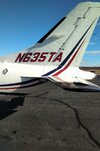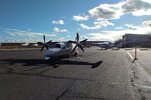Acadia
Well-Known Member
I am not seeing discussion on this one. I think the helicopter and BCT crash overshadowed, but this MU-2B crash in NY on Saturday took out six people. Not much information on it yet.
 www.ntsb.gov
www.ntsb.gov

 apnews.com
apnews.com
WPR25MA128.aspx
The dead in upstate New York plane crash included 2022 NCAA woman of the year and family members
A private plane that crashed in upstate New York over the weekend was carrying a close-knit family of physicians and a distinguished student athlete.


